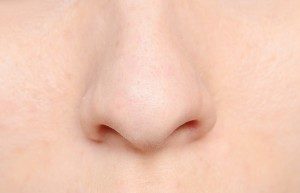 The following is a study with weird results, really weird results. And it makes me think of all the times I've heard people joke: "just smelling food makes me gain weight", because we all knew it wasn't true. But what if it was true? .... The results of this study done in mice are that actually smelling the food one eats results in weight gain, and not being able to smell the food results in weight loss - even if both groups eat the same amount of food. And the "supersmellers" (those with a "boosted" sense of smell) gained the most weight of all.
The following is a study with weird results, really weird results. And it makes me think of all the times I've heard people joke: "just smelling food makes me gain weight", because we all knew it wasn't true. But what if it was true? .... The results of this study done in mice are that actually smelling the food one eats results in weight gain, and not being able to smell the food results in weight loss - even if both groups eat the same amount of food. And the "supersmellers" (those with a "boosted" sense of smell) gained the most weight of all.
What? How could that be? Yes, the study was done in mice, but perhaps it also applies to humans (the researchers think so). The researchers think that the odor of what we eat may play an important role in how the body deals with calories - if you can't smell your food, you may burn it rather than store it. In other words, a link between smell and metabolism. Excerpts from Science Daily:
Smelling your food makes you fat
Our sense of smell is key to the enjoyment of food, so it may be no surprise that in experiments at the University of California, Berkeley, obese mice who lost their sense of smell also lost weight. What's weird, however, is that these slimmed-down but smell-deficient mice ate the same amount of fatty food as mice that retained their sense of smell and ballooned to twice their normal weight. In addition, mice with a boosted sense of smell—super-smellers—got even fatter on a high-fat diet than did mice with normal smell.
The findings suggest that the odor of what we eat may play an important role in how the body deals with calories. If you can't smell your food, you may burn it rather than store it. These results point to a key connection between the olfactory or smell system and regions of the brain that regulate metabolism, in particular the hypothalamus, though the neural circuits are still unknown. The new study, published this week in the journal Cell Metabolism, implies that the loss of smell itself plays a role, and suggests possible interventions for those who have lost their smell as well as those having trouble losing weight. "Sensory systems play a role in metabolism. Weight gain isn't purely a measure of the calories taken in; it's also related to how those calories are perceived," said senior author Andrew Dillin,...
The smell-deficient mice rapidly burned calories by up-regulating their sympathetic nervous system, which is known to increase fat burning. The mice turned their beige fat cells—the subcutaneous fat storage cells that accumulate around our thighs and midriffs - into brown fat cells, which burn fatty acids to produce heat. Some turned almost all of their beige fat into brown fat, becoming lean, mean burning machines. In these mice, white fat cells—the storage cells that cluster around our internal organs and are associated with poor health outcomes—also shrank in size. The obese mice, which had also developed glucose intolerance - a condition that leads to diabetes—not only lost weight on a high-fat diet, but regained normal glucose tolerance.
On the negative side, the loss of smell was accompanied by a large increase in levels of the hormone noradrenaline, which is a stress response tied to the sympathetic nervous system. In humans, such a sustained rise in this hormone could lead to a heart attack.
Dillin and Riera developed two different techniques to temporarily block the sense of smell in adult mice. .... In both cases, the smell-deficient mice ate as much of the high-fat food as did the mice that could still smell. But while the smell-deficient mice gained at most 10 percent more weight, going from 25-30 grams to 33 grams, the normal mice gained about 100 percent of their normal weight, ballooning up to 60 grams. For the former, insulin sensitivity and response to glucose - both of which are disrupted in metabolic disorders like obesity - remained normal.
Mice that were already obese lost weight after their smell was knocked out, slimming down to the size of normal mice while still eating a high-fat diet. These mice lost only fat weight, with no effect on muscle, organ or bone mass. The UC Berkeley researchers then teamed up with colleagues in Germany who have a strain of mice that are supersmellers, with more acute olfactory nerves, and discovered that they gained more weight on a standard diet than did normal mice. [Original study.]
